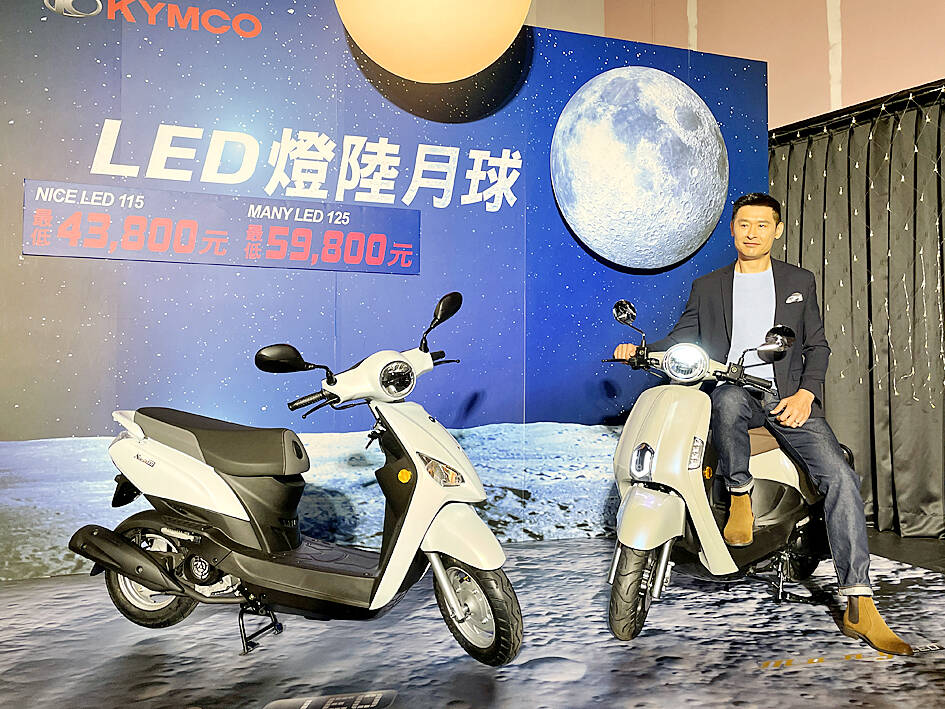Kwang Yang Motor Co (光陽工業), which sells electric scooters under the brand Ionex, yesterday said its first made-in-Thailand electric scooters would be available in Bangkok in the first half of next year.
The company also established a joint venture, Aionex Co, with PTT Public Co to create a scooter ecosystem in Thailand, it said.
“In Taiwan, Kwang Yang produces electric scooters, and deploys and operates a battery swapping system by its own,” Kwang Yang chairman Allen Ko (柯勝峯) told reporters. “But beyond Taiwan, it is not feasible to do it all by yourself as every part of the supply chain will require huge investments.”

Photo: Amy Yang, Taipei Times
In Thailand, the company is considering building its own electric scooter production line, or outsourcing the production to local partners, Ko said.
The Thai investment is part of the company’s three-to-five-year goal to expand its footprint in the Southeast Asian market, and Ko said Kwang Yang is looking to Vietnam and Indonesia for future expansions.
The company has received numerous inquiries for potential collaborations from Northeast Asia, India and the US, following the announcement of its partnerships with PTT, he said.
“As compared with India, we believe the Southeast Asian market will be easier to begin with. India is a much more complicated market than most people thought,” Ko said.
The Kaohsiung-based company hopes to see initial results of its overseas expansion within the next three to five years, he said.
Despite rising competition from existing fuel-powered scooter brands from Japan, the company said it is ahead of its rivals by three to five years in terms of technology.
On its home turf, Kwang Yang targets to recoup its top position in the fuel-powered scooter segment next year. The company, which sells its fuel-powered scooters under the KYMCO brand, lost the No. 1 spot last year for the first time in 22 years.
The company, which last month slashed the price of a popular model, GP125, to NT$39,800 from NT$57,000, yesterday announced the extension of the special offer to Sept. 20 as the strategy turned out to be very successful. The company has received 40,000 orders in just a month, which has never been seen in the history of Taiwan’s scooter industry, Ko said.
The company said it was unable to fully satisfy consumer demand as the orders received have greatly surpassed its capacity of 10,000 PG 125 scooters a month.
“We expect the backlog orders to be fully digested in October or November,” Ko said.
The promotion campaign helped boost Kwang Yang’s fuel-powered scooter sales last month to 26,014 units, up 60 percent from a year ago, and lifted the company’s market share to top 30.6 percent, the best since April last year, according to market researcher U-Car’s statistics.
Sanyang Motor Co Ltd (三陽工業) safeguarded its No. 1 position last month with sales of 33,443 units, capturing 39.3 percent in market share, according to U-Car.

GROWING OWINGS: While Luxembourg and China swapped the top three spots, the US continued to be the largest exposure for Taiwan for the 41st consecutive quarter The US remained the largest debtor nation to Taiwan’s banking sector for the 41st consecutive quarter at the end of September, after local banks’ exposure to the US market rose more than 2 percent from three months earlier, the central bank said. Exposure to the US increased to US$198.896 billion, up US$4.026 billion, or 2.07 percent, from US$194.87 billion in the previous quarter, data released by the central bank showed on Friday. Of the increase, about US$1.4 billion came from banks’ investments in securitized products and interbank loans in the US, while another US$2.6 billion stemmed from trust assets, including mutual funds,

Micron Memory Taiwan Co (台灣美光), a subsidiary of US memorychip maker Micron Technology Inc, has been granted a NT$4.7 billion (US$149.5 million) subsidy under the Ministry of Economic Affairs A+ Corporate Innovation and R&D Enhancement program, the ministry said yesterday. The US memorychip maker’s program aims to back the development of high-performance and high-bandwidth memory chips with a total budget of NT$11.75 billion, the ministry said. Aside from the government funding, Micron is to inject the remaining investment of NT$7.06 billion as the company applied to participate the government’s Global Innovation Partnership Program to deepen technology cooperation, a ministry official told the

Taiwan Semiconductor Manufacturing Co (TSMC, 台積電), the world’s leading advanced chipmaker, officially began volume production of its 2-nanometer chips in the fourth quarter of this year, according to a recent update on the company’s Web site. The low-key announcement confirms that TSMC, the go-to chipmaker for artificial intelligence (AI) hardware providers Nvidia Corp and iPhone maker Apple Inc, met its original roadmap for the next-generation technology. Production is currently centered at Fab 22 in Kaohsiung, utilizing the company’s first-generation nanosheet transistor technology. The new architecture achieves “full-node strides in performance and power consumption,” TSMC said. The company described the 2nm process as

Even as the US is embarked on a bitter rivalry with China over the deployment of artificial intelligence (AI), Chinese technology is quietly making inroads into the US market. Despite considerable geopolitical tensions, Chinese open-source AI models are winning over a growing number of programmers and companies in the US. These are different from the closed generative AI models that have become household names — ChatGPT-maker OpenAI or Google’s Gemini — whose inner workings are fiercely protected. In contrast, “open” models offered by many Chinese rivals, from Alibaba (阿里巴巴) to DeepSeek (深度求索), allow programmers to customize parts of the software to suit their